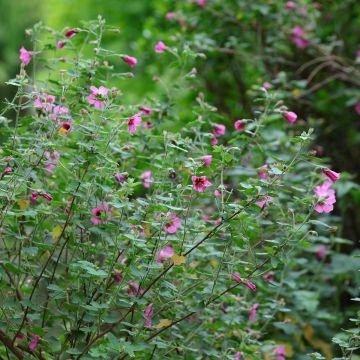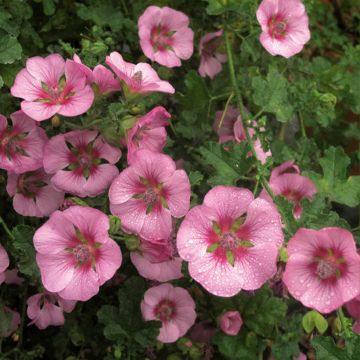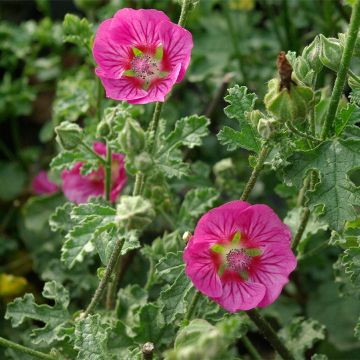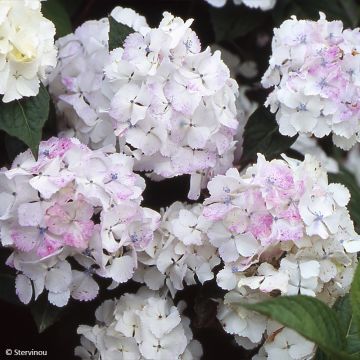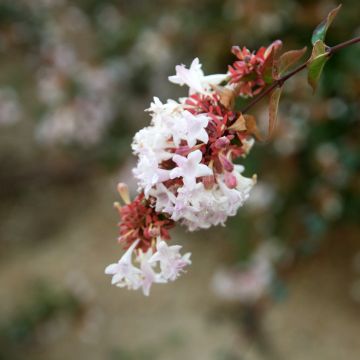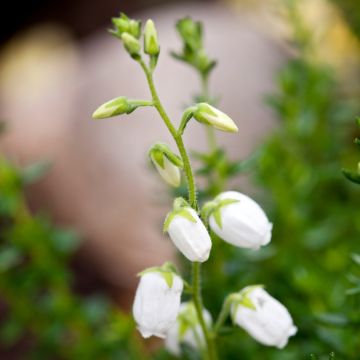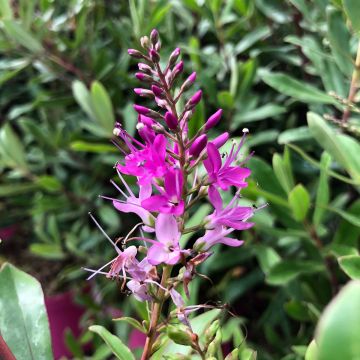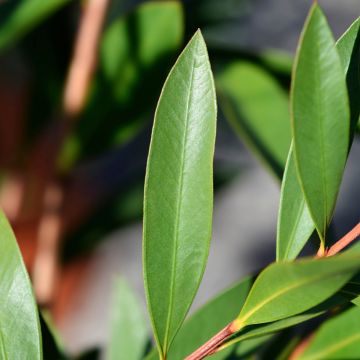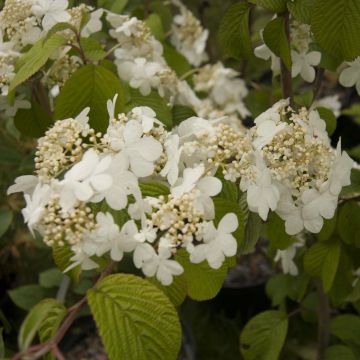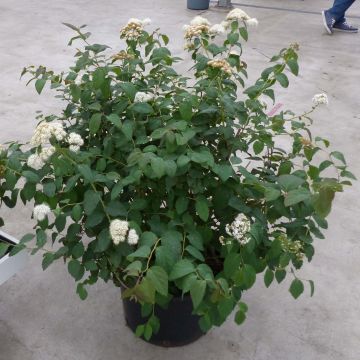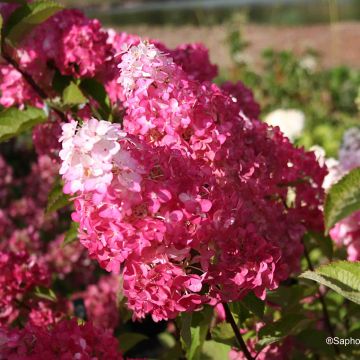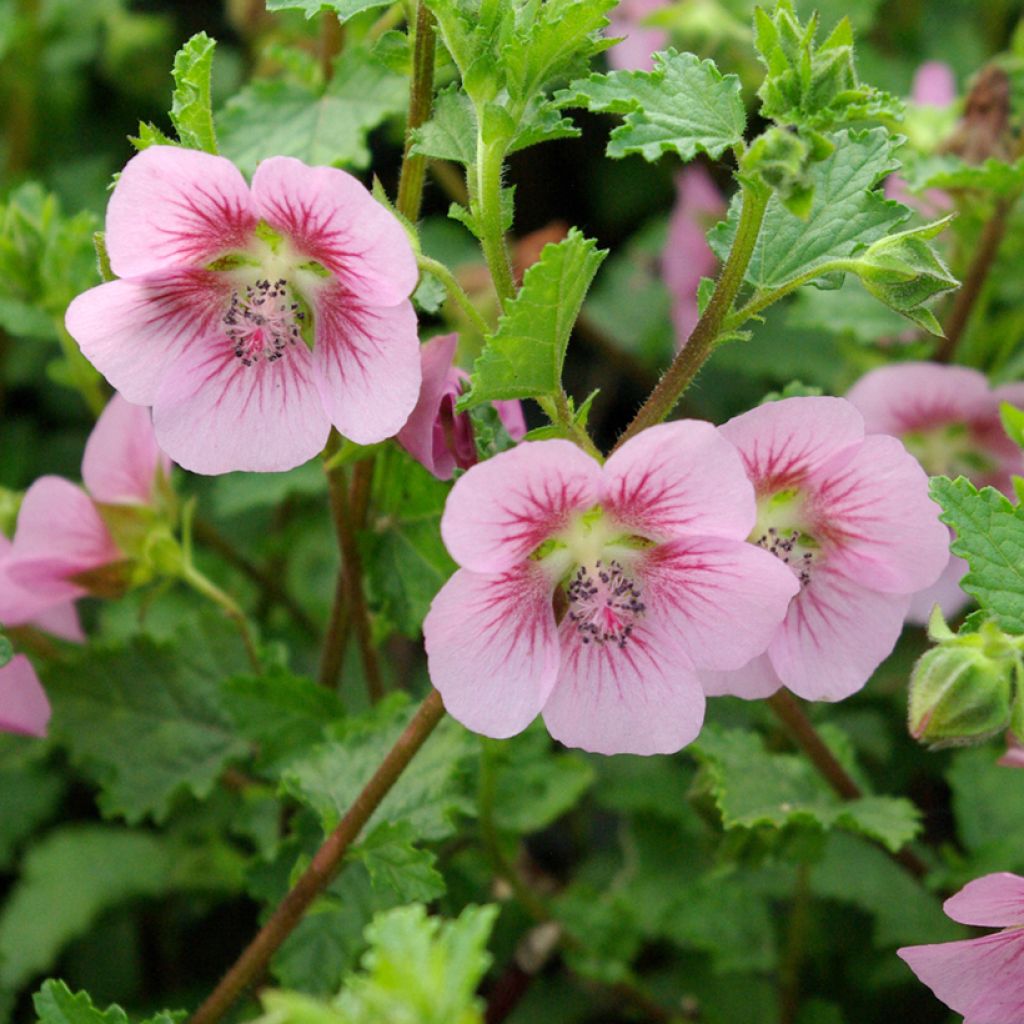

Anisodontea scabrosa Miss Pinky - Cape Mallow
Anisodontea scabrosa Miss Pinky - Cape Mallow
Anisodontea scabrosa Miss Pinky
Cape Mallow
Why not try an alternative variety in stock?
View all →This plant carries a 24 months recovery warranty
More information
We guarantee the quality of our plants for a full growing cycle, and will replace at our expense any plant that fails to recover under normal climatic and planting conditions.
From €5.90 for pickup delivery and €6.90 for home delivery
Express home delivery from €8.90.
Does this plant fit my garden?
Set up your Plantfit profile →
Description
Anisodontea scabrosa 'Miss Pinky' is a well-branched Cape mallow shrub capable of producing a multitude of light pink flowers with dark pink markings between spring and autumn, provided it has enough water and sunlight. Its foliage is fragrant and persists more or less throughout winter. It is a highly ornamental plant from South Africa, but it is sensitive to cold temperatures and should be grown in a large pot on the terrace or in the ground in coastal gardens.
Anisodontea, like the shrubby mallows, belongs to the large family of Malvaceae. It is a genus native to South Africa, which includes large woody perennials that are not very hardy. Anisodontea scabrosa is native to the Cape Peninsula, a region with winter rains. This shrub is found in sunny, sheltered, and bushy areas along the coast. This species with rough leaves grows in various soils, often disturbed, but mainly on low-lying coastal sands. Although not very hardy, this plant shows good resistance to summer drought once well established in the ground.
The cultivar 'Miss Pinky' is a South African horticultural creation by Moolman dating back to 2005. Half-perennial, half-shrub, this plant has a bushy and well-branched habit. It quickly reaches a height of 1.20 m with a spread of 90 cm, or even more when planted in the ground. This small shrub offers countless small round flowers with a diameter of 3 cm, consisting of five petals, in a beautiful pastel pink with dark pink veining around a throat of the same deep pink. These flowers, appearing in the axils of each leaf, are ephemeral, but they continuously renew themselves from May-June to October-November, throughout the entire growing season, in successive waves induced by proper watering and good growing conditions. The sparse foliage can be evergreen or deciduous depending on the severity of the winter. It consists of highly dissected, puckered, slightly hairy and sticky dark green leaves, with an aromatic scent.
Anisodontea 'Miss Pinky' is an excellent plant for terraces and patios, to be stored indoors in a cool and very bright place during cold winters. It thrives in full sun and shows greater longevity in well-drained soil. In regions with mild winters, it will look beautiful in a small informal hedge or in a bed of shrubs with blue flowers, such as Ceanothus 'Concha' or Ceratostigma 'Forest Blue', which will enhance its generous pink flowering. It also pairs well with purple shrubby salvias and purple foliage. Its combination with its cousins, Lavateras and Common Mallow, is full of romance.
Report an error about the product description
Plant habit
Flowering
Foliage
Botanical data
Anisodontea
scabrosa
Miss Pinky
Malvaceae
Cape Mallow
Cultivar or hybrid
Other Anisodontea
Planting and care
In open ground, in mild climates, plant Anisodontea scabrosa 'Miss Pinky' in full sun, in light, deep, well-drained soil, even limestone. Protect it from cold and drying winds in exposed regions. Once well established, it withstands summer drought quite well but will be less floriferous (it will go dormant) during the hottest months if water is lacking. Cut off faded flowers, regular pruning and watering stimulate vegetation, therefore flowering, and the plants are stronger. At the end of winter, shorten the stems by about 1/3 of their length to prevent the plant from becoming bare at the base. These plants have a relatively short lifespan when grown in pots, but are more long-lasting in open ground, in mild climates.
Container cultivation is suitable for this bush. Plant it in a large container with drainage holes and use fertile potting soil or special planting soil. Water regularly and abundantly, while allowing the substrate to dry out a little between waterings. Anisodontea can be grown indoors provided that the plant is given a period of vegetative rest in winter, in a cool and bright place, but in a frost-free environment and with reduced water supply.
Planting period
Intended location
Care
This item has not been reviewed yet - be the first to leave a review about it.
Summer-flowering shrubs
Haven't found what you were looking for?
Hardiness is the lowest winter temperature a plant can endure without suffering serious damage or even dying. However, hardiness is affected by location (a sheltered area, such as a patio), protection (winter cover) and soil type (hardiness is improved by well-drained soil).

Photo Sharing Terms & Conditions
In order to encourage gardeners to interact and share their experiences, Promesse de fleurs offers various media enabling content to be uploaded onto its Site - in particular via the ‘Photo sharing’ module.
The User agrees to refrain from:
- Posting any content that is illegal, prejudicial, insulting, racist, inciteful to hatred, revisionist, contrary to public decency, that infringes on privacy or on the privacy rights of third parties, in particular the publicity rights of persons and goods, intellectual property rights, or the right to privacy.
- Submitting content on behalf of a third party;
- Impersonate the identity of a third party and/or publish any personal information about a third party;
In general, the User undertakes to refrain from any unethical behaviour.
All Content (in particular text, comments, files, images, photos, videos, creative works, etc.), which may be subject to property or intellectual property rights, image or other private rights, shall remain the property of the User, subject to the limited rights granted by the terms of the licence granted by Promesse de fleurs as stated below. Users are at liberty to publish or not to publish such Content on the Site, notably via the ‘Photo Sharing’ facility, and accept that this Content shall be made public and freely accessible, notably on the Internet.
Users further acknowledge, undertake to have ,and guarantee that they hold all necessary rights and permissions to publish such material on the Site, in particular with regard to the legislation in force pertaining to any privacy, property, intellectual property, image, or contractual rights, or rights of any other nature. By publishing such Content on the Site, Users acknowledge accepting full liability as publishers of the Content within the meaning of the law, and grant Promesse de fleurs, free of charge, an inclusive, worldwide licence for the said Content for the entire duration of its publication, including all reproduction, representation, up/downloading, displaying, performing, transmission, and storage rights.
Users also grant permission for their name to be linked to the Content and accept that this link may not always be made available.
By engaging in posting material, Users consent to their Content becoming automatically accessible on the Internet, in particular on other sites and/or blogs and/or web pages of the Promesse de fleurs site, including in particular social pages and the Promesse de fleurs catalogue.
Users may secure the removal of entrusted content free of charge by issuing a simple request via our contact form.
The flowering period indicated on our website applies to countries and regions located in USDA zone 8 (France, the United Kingdom, Ireland, the Netherlands, etc.)
It will vary according to where you live:
- In zones 9 to 10 (Italy, Spain, Greece, etc.), flowering will occur about 2 to 4 weeks earlier.
- In zones 6 to 7 (Germany, Poland, Slovenia, and lower mountainous regions), flowering will be delayed by 2 to 3 weeks.
- In zone 5 (Central Europe, Scandinavia), blooming will be delayed by 3 to 5 weeks.
In temperate climates, pruning of spring-flowering shrubs (forsythia, spireas, etc.) should be done just after flowering.
Pruning of summer-flowering shrubs (Indian Lilac, Perovskia, etc.) can be done in winter or spring.
In cold regions as well as with frost-sensitive plants, avoid pruning too early when severe frosts may still occur.
The planting period indicated on our website applies to countries and regions located in USDA zone 8 (France, United Kingdom, Ireland, Netherlands).
It will vary according to where you live:
- In Mediterranean zones (Marseille, Madrid, Milan, etc.), autumn and winter are the best planting periods.
- In continental zones (Strasbourg, Munich, Vienna, etc.), delay planting by 2 to 3 weeks in spring and bring it forward by 2 to 4 weeks in autumn.
- In mountainous regions (the Alps, Pyrenees, Carpathians, etc.), it is best to plant in late spring (May-June) or late summer (August-September).
The harvesting period indicated on our website applies to countries and regions in USDA zone 8 (France, England, Ireland, the Netherlands).
In colder areas (Scandinavia, Poland, Austria...) fruit and vegetable harvests are likely to be delayed by 3-4 weeks.
In warmer areas (Italy, Spain, Greece, etc.), harvesting will probably take place earlier, depending on weather conditions.
The sowing periods indicated on our website apply to countries and regions within USDA Zone 8 (France, UK, Ireland, Netherlands).
In colder areas (Scandinavia, Poland, Austria...), delay any outdoor sowing by 3-4 weeks, or sow under glass.
In warmer climes (Italy, Spain, Greece, etc.), bring outdoor sowing forward by a few weeks.

































